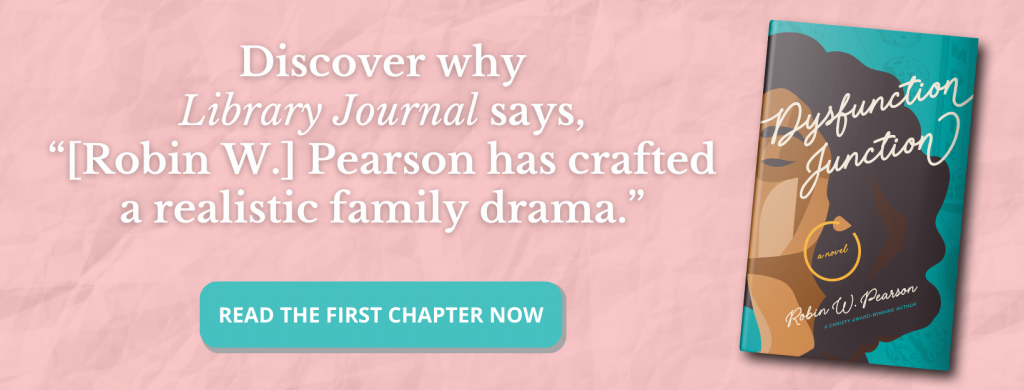Robin W. Pearson’s latest Southern family drama, Dysfunction Junction, centers around three sisters who, after an unexpected phone call, need to reckon with a past all of them would rather forget. Publishers Weekly called the novel “a heartfelt tribute to the bonds of sisterhood.” In this Q and A with Robin, she shares what inspired the story, what she hopes readers will come away with after reading the novel, and which authors have helped shape her into the author she is today.
What inspired this story?
When I was four years old, a neighbor nearly ran over me with his station wagon, and my sisters, parents, and I each tell a slightly different version or part of the event we think we all witnessed. Such is life, where factors like relationship—to one another and to God—age, maturity, and feelings impact our perspective. And such is Dysfunction Junction, in which my characters have unique ways of viewing and handling their shared life experience. But how they see things doesn’t mean that’s how it was. Or how it has to be.
What did you hope to communicate about mother-daughter relationships through this story?
Frankie, Annabelle, and Charlotte discover in Dysfunction Junction that mother-daughter relationships take work, and they don’t always look the way you want them to or expect. “Mothering” doesn’t come naturally to some; it takes God to move the heart. A nurturing relationship can occur between siblings and others in the community, and the absence or the abuse of this crucial connection can impact a family for generations.
What messages or themes do you focus on in this book?
In this story, I show how God can reveal, restore, and recover what’s broken, whether it’s an old house, relationships, a fragile faith, or lies disguised as truth. The women in Dysfunction Junction explore what love really means and see how God continually meets their need for relationship, family, and community in unexpected ways—through adoption, the bonds of sisterhood and friendship, multigenerational interactions, and marriage.
Charlotte propped her chin on her crossed arms and stared at the back of her house. Her old house. She didn’t think she’d ever swing in that old tire again or dance in the diamonds on the floor. It had already been over six years since she’d placed one toe on that back porch.
“I know you’re gon’ miss her.”
Excerpt from Dysfunction Junction
Which books and authors have shaped you most as a writer?
The Bible forms the basis of the truth in my fiction, so it’s the Book I open first. While I love Christian authors, I also enjoy Maeve Binchy’s impactful stories about families in small towns, Liane Moriarty’s way of crafting mystery and interesting characters, and Bebe Moore Campbell’s use of compelling dialogue and contemporary settings.
What do you hope that readers learn from Dysfunction Junction?
I hope readers see that truth doesn’t necessarily have an “s” and that the God of all truth will open our understanding if we seek Him. Through this book, I encourage them to explore heart-related issues concerning sibling dynamics and birth order; forgiving someone who hasn’t asked for it; and loving in spite of, not because of. When people read Dysfunction Junction, I want them to search their hearts and lives for evidence of their own dysfunction and seek God for healing and restoration.



